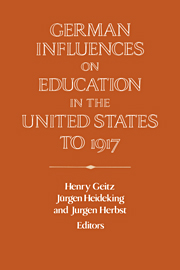Book contents
- Frontmatter
- Introduction
- PART ONE AMERICANS AND GERMANS LOOK AT EACH OTHER'S SCHOOLS
- PART TWO VARIETIES OF TEACHERS AND STYLES OF TEACHING
- PART THREE GERMAN SCHOOLS IN AMERICA
- 9 The von Mosheim Society and the Preservation of German Education and Culture in the New Republic, 1789-1813
- 10 The German-English Academy, the National German-American Teachers' Seminary, and the Public School System in Milwaukee, Wisconsin, 1851-1919
- PART FOUR THE GERMAN INFLUENCE ON HIGHER EDUCATION
- Index
9 - The von Mosheim Society and the Preservation of German Education and Culture in the New Republic, 1789-1813
Published online by Cambridge University Press: 05 January 2013
- Frontmatter
- Introduction
- PART ONE AMERICANS AND GERMANS LOOK AT EACH OTHER'S SCHOOLS
- PART TWO VARIETIES OF TEACHERS AND STYLES OF TEACHING
- PART THREE GERMAN SCHOOLS IN AMERICA
- 9 The von Mosheim Society and the Preservation of German Education and Culture in the New Republic, 1789-1813
- 10 The German-English Academy, the National German-American Teachers' Seminary, and the Public School System in Milwaukee, Wisconsin, 1851-1919
- PART FOUR THE GERMAN INFLUENCE ON HIGHER EDUCATION
- Index
Summary
Justus Heinrich Christian Helmuth arrived from Halle to assume pastoral responsibilities in Lancaster, Pennsylvania, in 1769. This representative of Halle pietism, who subsequently moved to Philadelphia in 1779, later succeeded Heinrich Melchior Muhlenberg as first pastor to the largest German-speaking Lutheran congregation in North America, the parish of St. Michael's and Zion. Before he arrived in America, Helmuth had already formed a commitment to education at the pietist center of Halle, where he had taken to heart the emphasis of the Franckes, father and son, for whom pedagogy lay at the heart of their pietist institution's commitment to both personal and social renewal. Between 1785 and 1818, Helmuth labored to erect a comprehensive system of German education ranging from parish elementary schooling to the von Mosheim Society, which he founded in 1789 as an adult literary society for the perpetuation of German language and culture.
Helmuth's adult educational effort, the von Mosheim Society, never extended far beyond Philadelphia, although corresponding members in New York and South Carolina did appear on the membership rolls. His plans to erect a Gymnasium in Philadelphia to prepare German youths for university training and for careers in the ministry and education also ended in frustration, despite temporary success with a truncated version of his plan from 1785 to 1815. Between 1811 and 1817 he founded and edited the Evangeliches Magazin for German speakers, regardless of denomination, urging them to educate their children in both German and English. Most of Helmuth's suggestions and efforts built upon earlier educational theories and practices imported from Halle or attempted in the charity school tradition of colonial Pennsylvania. Yet, even before his death in 1825, Helmuth and his vision of yoking classical and practical learning, pietist Lutheran doctrine, and the German language together had all been repudiated.
- Type
- Chapter
- Information
- German Influences on Education in the United States to 1917 , pp. 157 - 176Publisher: Cambridge University PressPrint publication year: 1995



